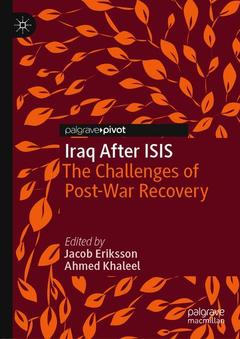Iraq After ISIS, 1st ed. 2019 The Challenges of Post-War Recovery
Coordonnateurs : Eriksson Jacob, Khaleel Ahmed

This book explores the challenges of creating a secure and stable Iraq in the wake of the military campaign against the Islamic State of Iraq and al-Sham (ISIS). Analyzing the impact of the fight against ISIS, the collection provides answers to questions relating to both political and humanitarian considerations in Iraqi post-war recovery. In their analysis, the editors and authors develop policy recommendations for the international and Iraqi political communities. It is essential reading for those interested in politics, international relations, post-war recovery, counter-terrorism, Middle Eastern studies and Iraqi studies scholars.
Jacob Eriksson is the Al Tajir Lecturer in Post-war Recovery Studies in the Department of Politics at the University of York, UK.
Ahmed F. Khaleel is a human rights defender and a tutor of Arabic language in the Department of Language and Linguistic Science, University of York, UK.
Date de parution : 12-2018
Ouvrage de 135 p.
14.8x21 cm
Thème d’Iraq After ISIS :
Mots-clés :
Iraq; ISIS; post-war recovery; military campaign against ISIS; counter-terrorism; Iraqi studies; Middle East politics; humanitarian impact of conflict; intra-group conflicts; transitional justice; civilians and ISIS; Intra-Shia political dynamics; Iraqi Sunni Arabs; post-ISIS; international politics in the Middle East; peace studies; policy studies; terrorism and conflict; international community and ISIS; post-conflict studies



